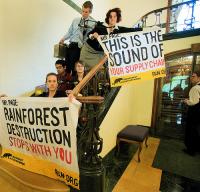 May 5, 2010
May 5, 2010
Update: five activists locked themselves to the staircase of the Lake Office, blocking the entrance to the company’s executive offices for over two hours. All five activists were arrested.
—
Nation’s Largest Private Agribusiness Company Under Fire for Rainforest Destruction
Wayzata, Minn. – Six activists with Rainforest Action Network (RAN) have taken over the executive offices of the nation’s largest private agribusiness company. Playing a loud recording of chainsaws cutting down rainforests and holding signs reading “This is the sound of your supply chain,” and “Mr. Page: Rainforest Destruction Stops with You,” the activists have locked themselves to the staircase of the Lake Office, blocking the entrance to the company’s executive offices.
A dozen demonstrators are conducting a solidarity vigil at the front of Cargill’s Wayzata headquarters, greeting employees as they enter with a 12 ft paper mache orangutan and a sign reading: “Rainforest Destruction Starts with Cargill.”
The activists have requested a meeting with Gregory Page, Cargill’s CEO, and are refusing to leave until he agrees to stop destroying rainforests and to implement a comprehensive palm oil policy covering its entire supply chain.
“Cargill has been lying to its customers and to our community,” said Eric Nielsen, local activist participating in today’s protest. “We want CEO Greg Page to act now to stop Cargill’s destruction of rainforests before it’s too late.”
The protest comes in the wake of a damning report directly linking Cargill, the nation’s largest importer of palm oil, to rainforest destruction in Borneo. The report, released yesterday, documents systematic failures by Cargill to comply with international palm oil standards and respect Indonesian law throughout its palm oil supply chain. The report also documents rainforest destruction on two plantations that Cargill owns, but has hidden from the Indonesian government and its customers. Over 10,500 hectares of rainforest have been destroyed since 2005, causing significant conflict with traditional and Indigenous communities.
“Cargill has destroyed an area of rainforest the size of Disney World in Borneo, endangering orangutans, polluting waterways and taking land and livelihoods from local communities,” said Leila Salazar-Lopez of Rainforest Action Network. “How unsustainable can a company be?”
Palm oil is one of the most commonly found ingredients in thousands of consumer products, from soap and lipstick, to breakfast cereal and soymilk. Its use is widespread and increasing around the world, but particularly in the United States, where its consumption has tripled in the last five years. As the nation’s largest importer of palm oil, Cargill supplies the commonly used ingredient to some of the nation’s largest food companies, including General Mills, Nestle, Mars and Kraft, making it likely that almost all Americans have bought Cargill’s palm oil sometime within the last week.
Unfortunately, palm oil has been tightly linked to the destruction of some of the world’s remaining rainforests. Expanding consumption has triggered expanded production, replacing once lush rainforests with palm oil plantations and endangering unique species including orangutans and sun bears.
The full report on Cargill’s activities, entitled Cargill’s Problems with Palm Oil, A Burning Threat to Borneo, can be downloaded at: http: www.ran.org/cargillreport
